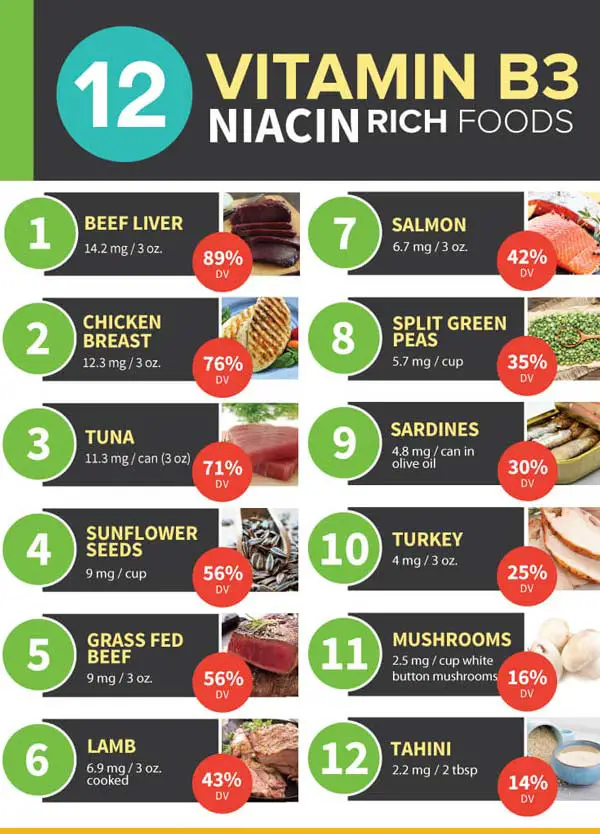Depression is a disorder that haunts almost everyone. Niacin is one of the solutions thought to fight this disorder. How effective is niacin for depression? What do reviews say about this therapy? Read on to find out.
How Niacin and Depression are linked
Depression is a complex issue. The fact is, a lot of things contribute to depression.
- Overall health
- Stress
- Mineral and vitamin deficiencies (Niacin falls under this category)
- Hormone levels
- Diet

Niacin (vitamin B3) is a colorless hydrophilic organic compound classified as an essential dietary nutrient among humans.
Niacin comes in two forms you can buy:
Niacin: This is the flushing form which means that you will develop a burning sensation in your skin resembling a small sunburn. For some it is uncomfortable. This is usually the form that is recommended by most doctors (Hoffer and Yu) since niacinamide can be attributed to poisoning your liver.
Niacinamide: This is the form that has no flushing effect. It is hypothesized that the flushing effect is needed for the best effect. You must be careful with this one because it might cause damage to your liver when you take it in a high dosage (www.flexyourbrain.com).
What is the relation between Niacin and Depression
Serotonin:
In the brain, low levels of neurotransmitter serotonin are associated with depression, one of the building blocks of serotonin is the amino acid tryptophan, and one of the building blocks of tryptophan is niacin. Tryptophan also helps the body supply itself with niacin. If tryptophan is divided between serotonin production and niacin production, serotonin production is likely to be inadequate. Supplemental niacin and tryptophan can improve symptoms of depression (www.Livestrong.com).
Another means by which niacin could enhance a person’s mood is through increasing concentrations of serotonin. A study by Tian, Li, Ma, et al. (2013) documented that supplementation with Nicotinamide (100g) inhibited the degradation of monoamines, including serotonin. The researchers discovered that within just four hours of administering the Nicotinamide (100g) supplement, plasma serotonin concentrations significantly increased.
The increase in serotonin concentrations following supplemental niacin is thought to be a result of reduced serotonin degradation as a result of affecting the methylation cycle. Though it isn’t known as whether niacin supplementation increases central concentrations of serotonin dysfunction is not always implicated in major depression, it is understood that increasing serotonin signaling is often an effective way to improve mood.
Anti-inflammatory effect

A means by which niacin supplementation may combat symptoms of depression is through reducing neuroinflammation. As of 2016, researchers agree that many cases of major depression are a direct consequence of ongoing neuroinflammation. In depressed individuals; circulating concentrations of inflammatory biomarkers within the central nervous system usually appear elevated.
Among individuals with excessive concentrations of inflammatory mediators such as cytokines, it is thought that these mediators send signals to the brain that disrupt homeostatic neurological function.
Specifically,cytokines are understood to harm and modulate the release,uptake,and production of neurotransmitters-making it easy to understand how neuroinflammation could lead to a monoaminergic imbalance of corresponding depressed mood. Research by Offermanns and Schwaninger (2015) shows that niacin is capable of improving neuroinflammation by activating HCA (2).
Cholesterol modulation
Niacin supplementation is a medically-supported intervention for the management of hypercholesterolemia, a condition characterized by abnormally high levels of cholesterol in the blood that may lead to onset of heart attacks, peripheral artery disease and/or stroke. Given the association between cholesterol abnormalities and depression, it is reasonable to theorize that niacin-induced modulation of cholesterol may yield downstream antidepressant effects. A study by Partonen, Haukka, Virtamo, et al. (1999) provided evidence that low serum total cholesterol is directly correlated with major depression and suicide risk.
Homocysteine regulation
Though not frequently discussed, another potential mechanism by which niacin might improve mood is through modulation of homocysteine. Folstein, Liu; Peter et al. (2007) proposed a homocysteine hypothesis of depression in which high homocysteine concentrations lead to neurotransmitter deficits and vascular disease to cause depressive symptoms. While not every person with depression exhibits a high level of homocysteine, many studies support the idea that homocysteine concentrations are high among depressed individuals compared to non-depressed controls. A Homocysteine concentration is to increase dietary intake of folate.
Oxidative stress reduction
It is possible that some of niacin’s mood enhancing effect might be related to decreasing oxidative stress. A considerable amount of research suggests that excessive oxidative stress likely plays a minor-to-moderate role in onset and perpetuation of depressive disorders. For example, a meta-analysis by Liu, Zhong, Liao, et al (2015) discovered that free radical and oxidative damage concentrations were significantly greater in depressed patients compared to controls. It was also noted that serum antioxidant levels and total antioxidant capacity were significantly lower among those depression compared to controls.
A study by Hamoud, Kaplan, and Meilin (2013) discovered that administration of niacin supplements for a 12-week duration significantly decreased oxidative stress. The reduction in oxidative stress was evidenced by lower thiobarbituric acid reactive substances, lipid peroxides, and paraoxonase activity compared to pre-treatment. Among depressed patients with high oxidative stress, niacin supplementation may be useful-especially oxidative stress co-occurs with cholesterol abnormalities.
Niacin for depression Reviews-Forums and Mayo
According to the Mayo clinic niacin is rated grade A for helping to treat pellagra, which is niacin deficiency and which leads to depression. The Mayo Clinic states: Niacin (vitamin B3) and niacinamide are U.S Food and Drug Administration (FDA)-approved for the treatment of pellagra, or niacin deficiency. Pellagra is a nutritional disease that occurs due to insufficient dietary amounts of vitamin B3 or the chemical it is made from (tryptophan).Symptoms of pellagra include skin disease, diarrhea, dementia, and depression.
A preliminary report on the treatment with nicotinic acid of 15 patients suffering from various forms of depression shows 14 much improved. This result is so sufficient interest to merit further investigation. The rationale of the procedure lies in the possible association between abnormal mental states and disturbances of cerebral circulation, and it was suggested that measures which lead to vasodilatation also bring about and improvement in mental state
(OMNS) Doctors report that mental problems such as depression often have a typical cause: inadequate nutrients in the brain. Nutritionally oriented doctors say treating these problems disorders is to give the body the extra nutrients it needs, especially in situations of excessive stress.
Orthomolecular medical scientists say that the future of psychiatry is in nutrition because nutrition has such a long history of safe and effective solve a lot of physiological problems. Nutrients such as B vitamins are more effective when taken regularly, taken at reasonably high doses, and taken in combination with vitamin C, essential fatty acids, and the minerals magnesium and selenium
Dr. James Greenblatt of Mc Hospital, a Harvard Medical school teaching hospital, is currently using Inositol supplementation as part of the treatment of patients with mental illness, particularly depression, panic disorder, and obsessive-compulsive disorder(OCD).A considerable body of research is accumulating that Inositol plays an important role in treating these mental illnesses.Inositol’s efficacy in the absence of side effects makes it an attractive addition to treatment plans for specific mood disorders(www.curezone.com).
More than 15 million American adults seek treatment for depression each year. However, a first-of-its-kind study reveals and eye-opening disconnect between the priorities of patients and clinicians when it comes to the information needed to make decisions about treatment options. It was estimated in 2013 that 8 percent of high schools students attempted suicide, according to the Centers for Disease Control and Prevention.
And now, a reanalysis of data in BMJ found that one of the antidepressants on the market is ineffective and even harmful for treating major depression in adolescents. The new findings are in contrast to the original study from 2001.Researchers of the original industry funded study found just one of a group of serotonin re-uptake inhibitors, was safe and effective (www.depressionforums.com)
Benefits of niacin for depression
Few side effects: When ingested at reasonable doses, niacin is not associated with significant side effects. Even at fairly high doses such as between 100mg and 2000mg most individuals are able to tolerate administration. The side effects of niacin tend to diminish as the body adapts to its administration over a period of several weeks.
Low cost: On average, a bottle of niacin containing 250mg extended release capsules dosed at 500mg costs less than 15 dollars online, compared to most prescription antidepressants which may cost several hundred dollars for a 30 day. This is a bargain.
Minimal interactions: Niacin is not known to interact with most prescription drugs and supplements. This means a majority of medications and/or supplements that a person might be taking treat a medical condition probably won’t interact with niacin.
Non-pharmaceutical: Appealing to many is the fact that niacin is a non-pharmaceutical intervention that might be effective for the management of depression.
Improved mood: The B vitamin niacin is important for functioning of all cells, including the cells of the brain and nervous system. When the nervous system is working properly, symptoms such as restlessness, anxiety, mood swings and lack of sleep can be prevented. You will be more mentally alert when your body is properly supplied with B vitamin complex, especially niacin (www.livestrong.com).
Niacin therapy and dosage for depression and anxiety
Vitamin B3 is available in several different supplements forms:
- Niacinamide
- Niacin
- Inositol hexaniacinate
Always start small with your niacin dosage. You can start as low as 100mg and take it three times a day after meals. You will build up a tolerance to niacin and its flushing effect, so therefore you can steadily increase your daily dosage of niacin to around 500mg to 1000mg per dose as prescribed on Andrew Saul’s website. If you take niacin on an empty stomach you will flush a lot faster with more intensity.
Use niacin exactly as directed on the label, or as prescribed by your doctor. Do not use in longer or smaller amounts or for longer than recommended. Niacin is sometimes taken at bedtime with low-fat snack. Follow your doctor’s instructions.
Niacin Food Sources
Foods high in niacin include:
- Organ meat(liver,heart,kidneys)
- Chicken
- Beef
- Fish
- Wheat flour
- Maize flour
- Eggs
- Milk

Side Effects
Niacin can cause certain side effects such as:
- Warmth
- Itching
- Redness
- Tingly feeling under your skin
These effects can be made worse if you drink alcohol or hot beverages shortly after you take niacin. These effects should disappear over time as you keep taking the medication.
Sources and References
- http://www.ncbi.nim.nih.gov/pubmed23426511
- http://www.ncbi.nim.nih.gov/pubmed262604553
- http://www.ncbi.nim.nih.gov/pubmed25766751
- http://www.ncbi.nim.nih.gov/pubmed25455298
- http://www.ncbi.nim.nih.gov/pubmed9111854
- http://www.ncbi.nim.nih.gov/pubmed17541043
- http://www.ncbi.nim.nih.gov/pubmed26445247
- http://www.ncbi.nim.nih.gov/pubmed26579881
- mentalhealth.com
- dailymeditation.com
- umm.edu/health/vitamin.b3.niacin
